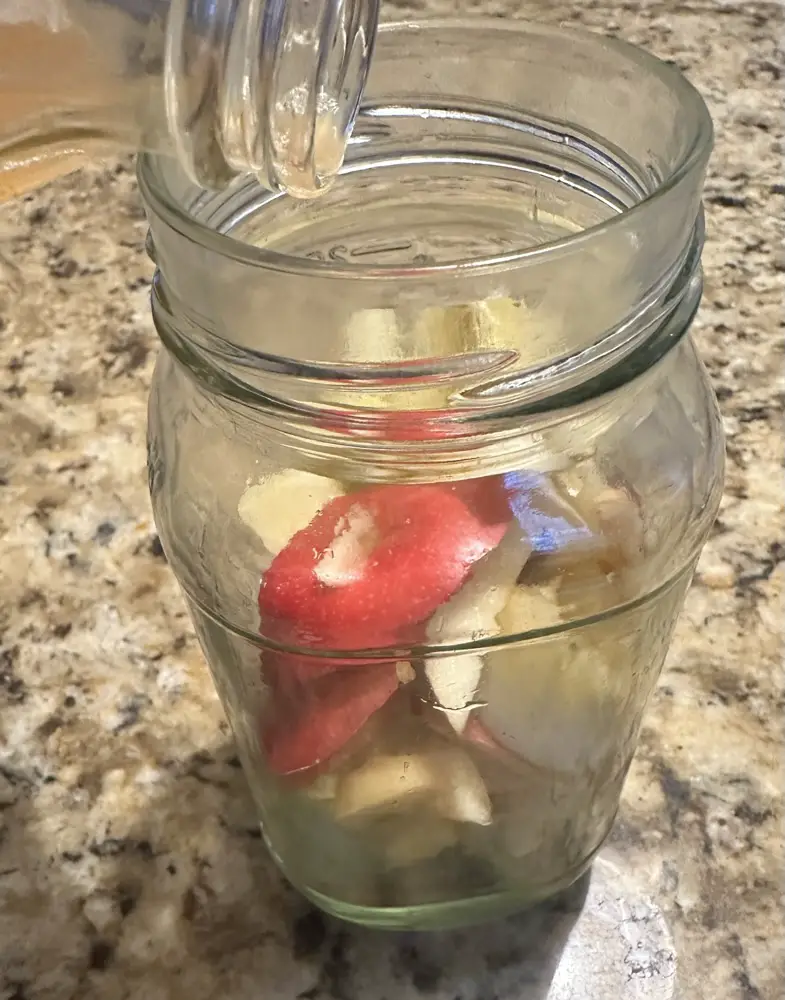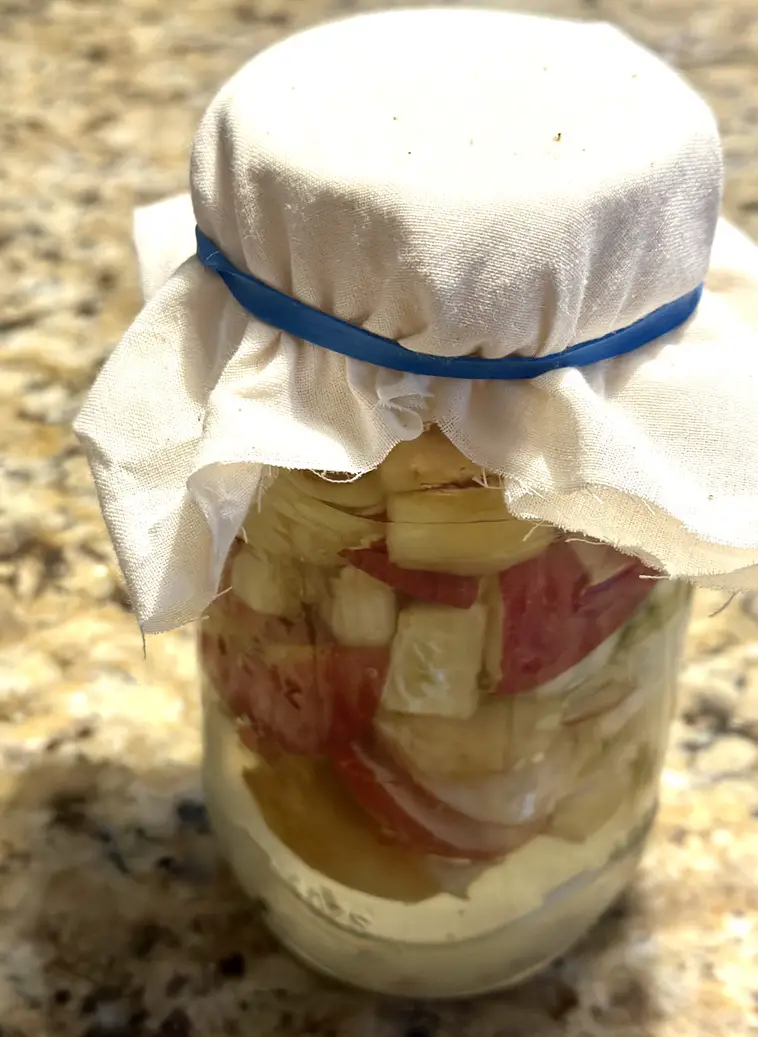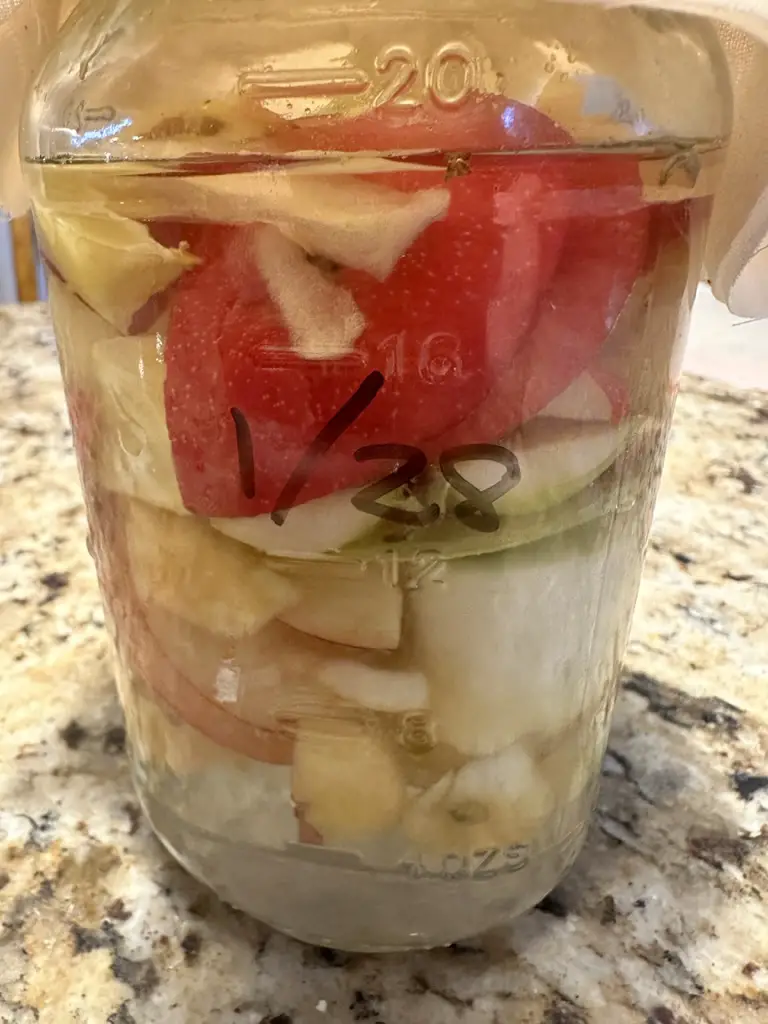The Wonders of Apple Cider Vinegar
Apple cider vinegar (ACV) is made from fermented apple juice. It contains a wealth of bioactive ingredients like acetic acid, antioxidants, and polyphenols. These components are believed to be responsible for its health-promoting properties:
Health Benefits:
- Digestive Aid: ACV can help to improve digestion. Its acidic nature may aid in the breakdown of food and absorption of nutrients.
- Blood Sugar Regulation: Consuming ACV has been shown to have a modest effect on blood sugar levels, making it a companion for diabetes management.
- Heart Health: Some studies suggest that ACV can lower cholesterol and triglyceride levels, factors that contribute to heart disease.
- Weight Management: Incorporating ACV into your diet may help with weight loss efforts as it can increase feelings of fullness and help people eat fewer calories.
- Antimicrobial Effects: ACV is known to have antibacterial properties, which can be useful in preventing infections and in food preservation.
Other Potential Benefits:
- Weight loss: Some studies suggest that consuming apple cider vinegar may help with weight loss by promoting feelings of fullness, reducing calorie intake, and improving metabolism. However, more research is needed to confirm these effects.
- Blood sugar control: Apple cider vinegar may improve insulin sensitivity and lower blood sugar levels after meals, which could be beneficial for people with diabetes or those at risk of developing it. Again, more research is needed in this area.
- Antimicrobial properties: Apple cider vinegar has been used traditionally as a natural disinfectant and antimicrobial agent. It may help kill harmful bacteria and pathogens when used topically on the skin or as a food preservative.
- Heart health: Some studies suggest that apple cider vinegar could help lower cholesterol and blood pressure levels, which are important factors for heart health. However, more studies are needed to confirm these effects.
- Digestive health: Some people use apple cider vinegar to alleviate digestive issues like indigestion, bloating, and acid reflux. It’s thought that the acidity of vinegar may help balance stomach acid levels, though individual responses may vary.
- Skin and hair health: Apple cider vinegar is sometimes used as a natural remedy for acne, dandruff, and other skin and scalp conditions. Its antimicrobial properties may help combat bacteria and fungi responsible for these issues.
- Reducing inflammation: Some studies suggest that apple cider vinegar may help reduce inflammation in the body, which could benefit conditions like arthritis and other inflammatory diseases. However, more research is needed to confirm these effects.
It’s essential to note that while apple cider vinegar has potential health benefits, it should be used in moderation and diluted with water when consumed to prevent potential side effects like tooth enamel erosion and irritation of the throat and stomach lining. Additionally, it’s always a good idea to consult with a healthcare professional before adding apple cider vinegar to your routine, especially if you have any underlying health conditions or are taking medications.
Does Apple Cider Vinegar really help with weight loss?:
Several small-scale studies have suggested that consuming ACV may lead to modest reductions in body weight, body fat, and waist circumference. These effects are thought to be attributed to ACV’s ability to promote feelings of fullness, reduce calorie intake, and improve metabolism. However, many of these studies have limitations such as small sample sizes, short durations, and varied methodologies, making it challenging to generalize the findings.
Overall, while there is some evidence to suggest that ACV may have potential benefits for weight management, it’s important to interpret the findings cautiously and recognize that more robust research is needed to confirm its effectiveness. Additionally, ACV should be consumed in moderation and as part of a balanced diet and healthy lifestyle, as relying solely on ACV for weight loss is unlikely to produce significant or sustainable results. As always, consulting with a healthcare professional before making significant changes to your diet or weight loss regimen is recommended.
 Personally, I have lost weight while drinking apple cider vinegar diluted in water. I made no other changes to my diet or lifestyle and lost about 5 lbs in 2 months when I drank 2 tablespoons of organic apple cider vinegar diluted in 2 cups of water everyday. I felt more full and was less likely to eat anything else during or after drinking ACV. It may be worths try to see if it works for you.
Personally, I have lost weight while drinking apple cider vinegar diluted in water. I made no other changes to my diet or lifestyle and lost about 5 lbs in 2 months when I drank 2 tablespoons of organic apple cider vinegar diluted in 2 cups of water everyday. I felt more full and was less likely to eat anything else during or after drinking ACV. It may be worths try to see if it works for you.
Making your own apple cider vinegar (ACV) at home can offer several benefits:
- Control over ingredients: When you make your own ACV, you have control over the quality and source of the ingredients. You can choose organic apples and ensure that no harmful additives or preservatives are included.
- Cost-effective: Homemade apple cider vinegar can be more cost-effective than buying commercially produced varieties, especially if you have access to inexpensive or free apples. It costs next to nothing to make ACV at home. You only need apple scraps, a few tablespoons of sugar, and a glass jar with a cloth cover. It also takes very little effort on your part.
- Sustainability: Making ACV at home reduces the need for purchasing bottled vinegar, which can help reduce packaging waste and lower your carbon footprint.
- Customization: You can customize the flavor and acidity of your homemade ACV by adjusting factors such as the type of apples used, fermentation time, and fermentation conditions. This allows you to tailor the vinegar to your personal preferences.
- Freshness: Homemade apple cider vinegar is typically fresher than store-bought versions since you can make it from freshly harvested apples. This freshness may result in a more vibrant flavor and potentially greater nutritional content.
- Health benefits: Some people believe that homemade apple cider vinegar may offer additional health benefits compared to commercial varieties, as it retains more of the beneficial enzymes and nutrients from the apples during fermentation. However, scientific evidence supporting this claim is limited. Homemade apple cider vinegar contains “mother,” which is indicative of active enzymes and beneficial bacteria. Many store bought brands don’t have “mother” and lack the health benefits it contains.
- Satisfaction: Making your own food is rewarding. There’s a sense of satisfaction and accomplishment that comes from making your own food products at home. Producing your own ACV allows you to engage in a hands-on fermentation process and connect with the tradition of homemade food preservation.
How to Make Apple Cider Vinegar at Home
Ingredients:
- Fresh apples (preferably organic)
- Sugar
- Water
Equipment:
- A large glass jar
- Cheesecloth or paper coffee filter
- A rubber band or string
Method:



- Prepare the Apples: Wash and chop your apples into medium-sized pieces. Include the peels and cores, as they contain natural yeast and boost fermentation.
- Start the Fermentation: Place the apple pieces in a clean, sterilized jar. Mix a solution of water and sugar (about 1 tablespoon of sugar per cup of water) and pour it over the apples until they are completely submerged. The sugar will feed the fermentation process. For better results, also add a tablespoon of AVC with “mother” as starter.
- Cover the Jar: Use a piece of cheesecloth or a coffee filter to cover the opening of the jar. Secure it with a rubber band or string. This covering will keep out bugs and debris while allowing the mixture to breathe.
- First Fermentation: Leave the jar in a warm, dark place for about 3-4 weeks. Stir the mixture every few days to prevent mold. The liquid will gradually darken, and a sour smell will develop. I recommend writing the start date down on the jar, so you know how much time has past.

- Strain the Apples: After the first fermentation, strain out the apple pieces, returning the liquid to the jar.
- Second Fermentation: Cover the jar again with the cheesecloth or filter. Allow the liquid to ferment for an additional 3-4 weeks, stirring every few days.
- Test the Vinegar: After 3-4 weeks, taste your vinegar. If it has a pleasantly tart and vinegar-like taste, it’s ready. If not, leave it to ferment for a few more weeks, checking it periodically.
- Bottle Your ACV: Once the vinegar has reached your desired acidity, transfer it to a bottle with a lid for storage. It is best to refrigerate the AVC at this point to retain freshness.
Tips:
- The “mother” is a colony of beneficial bacteria involved in the creation and fermentation of the vinegar. It’s a sign of a healthy ACV and can be used to jumpstart future batches.
- Always use glass containers, as metal or plastic can react with the acidity of the vinegar.
Home-made apple cider vinegar can be a rewarding DIY project with numerous health benefits. Plus, it adds a delicious zing to salads, sauces, and even your morning glass of water!

Homemade apple cider vinegar in a clear glass bottle has the “mother” forming a natural cloudy layer at the bottom—indicative of active enzymes and beneficial bacteria.
For More Ec0-Friendly Money Saving Tip See Green Ways to Save Green
DIFER.ORG Supports the Reduction of Waste





